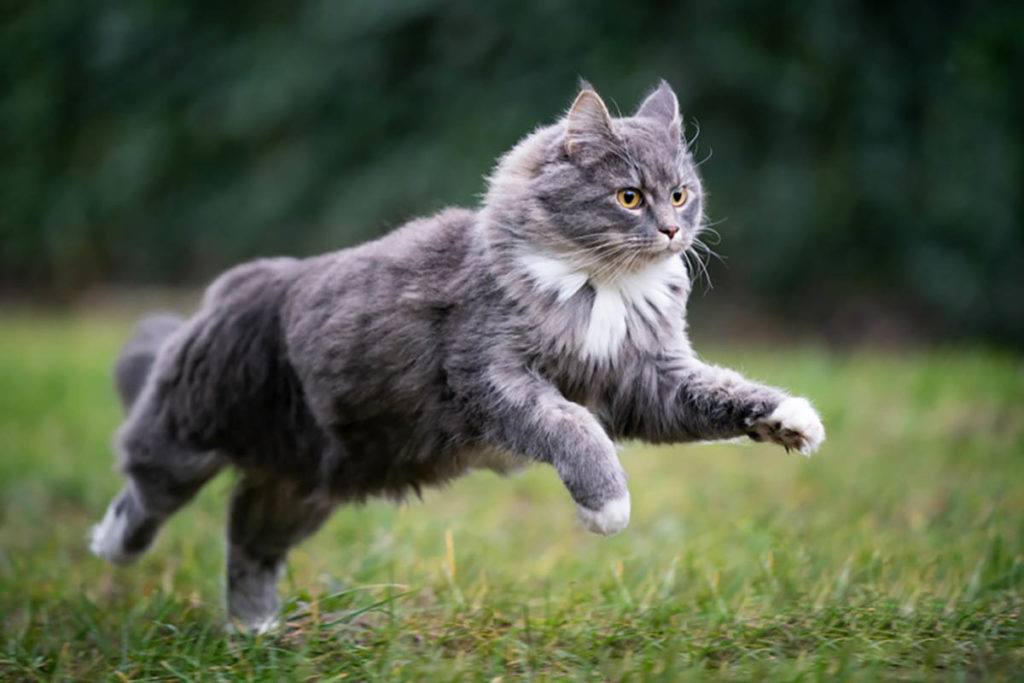Cats have different energy levels, depending on their health, breed, and age. Kittens, for example, are more energetic than most older cats. Some breeds have more energy and agility, bouncing around the house and shredding all your curtains.
If your cat is being a little too exuberant for your liking, we can help. Below, we’ll discuss the problem areas and ways to curb or channel the behavior positively.
The 9 Tips to Calm Your Hyper Cat
1. Make Sure They Have a Proper Outlet
Sometimes, if a cat has pent-up energy, it can cause behaviors that we consider bad. They might be ultra-destructive and chew, claw, and destroy your furniture and belongings.
Pent-up energy can also lead to rough playing and painful wounds if your cat scratches you. To curb these tendencies, it is essential to have a proper exercise outlet for your cat. If you have a particularly active kitty, accommodate them by providing several forms of entertainment.
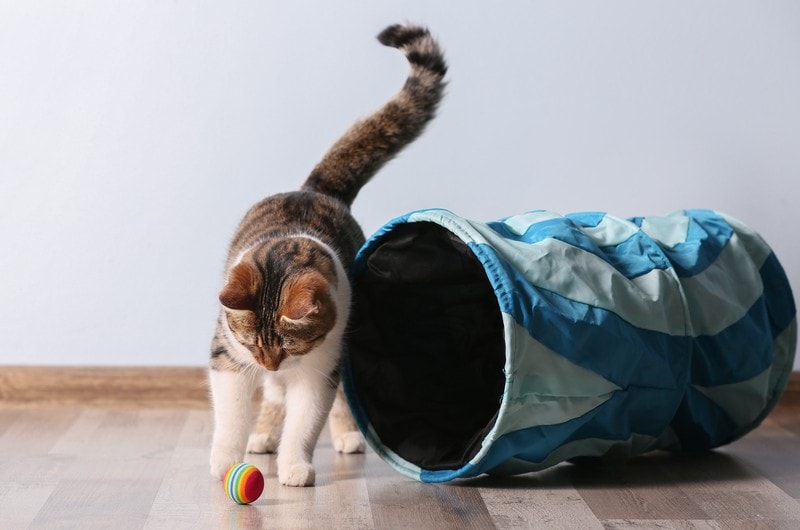
2. Eliminate Household Irritants
Sometimes, external triggers can enhance the hyper behavior. For example, if you have a loud, chaotic household, this energy might transfer to your cat and make them join the party.
If you try to calm down your family, your cat might follow suit. The only way you’ll know is to try to eliminate the environmental triggers.
3. Get Two Cats!
It might seem counterproductive to get too crazy felines if you’re already having problems with one. However, when a cat is hyper, they may need someone to play with. Who could match their energy better than another cat?
Domestic cats are very social creatures that thrive on interaction. They love having a playmate who can match them step by step. You might be surprised how well the new cat gets along with your existing cat.
They can entertain each other rather than divert the energy to your belongings or people in your home. Plus, having two cats really can curb loneliness. So, it might be time to shop around. If you purchase a cat from a breeder, ensure they are reputable with a history of healthy litters. But we recommend going to your local shelter to adopt a kitty in need.
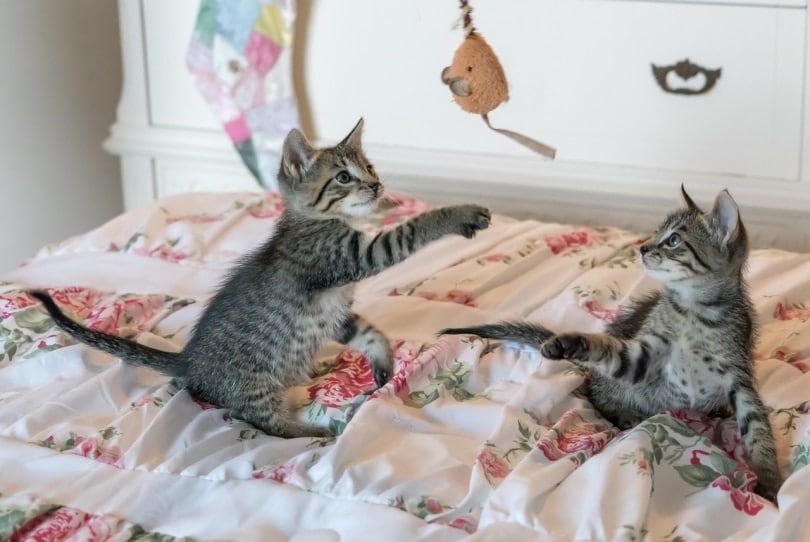
4. Have Toys & Entertainment
You can purchase toys, cat trees, cat condos, cat exercise wheels, wall climbs, and bridges to put around your home that enhance healthy play. Some cats might have a preference for various toys, and you can try several types to determine which they prefer.
Cat Scratching Posts
Scratching posts can be made of cardboard, sisal rope, sisal fabric, and carpet. Your cat can sharpen their claws to keep them healthy rather than damage your furniture.
Cat Trees/Condos
Cat trees and condos give your kitty a place to nap, play, and perch. They are perfect for the cats who love to be up high while they play or nap. If you have the space, you can find cat trees as tall or wide as you need.
Toys/Teasers
Toys and teasers can be used for solo or interactive play. Some stuffed toys come with catnip to enhance playtime. Teasers usually use feathers, bells, or other attractive features to get your cat’s attention. These items activate their prey drive and help your cat burn off some of that steam.
Our Favorite Catnip Toy Great cat toys are crucial to keeping your cat happy and healthy. We love Hepper's Catnip Stick Toy because it's handmade in the USA, available in a cool range of colors, and sturdy enough to withstand your cat's sharp claws. Best of all, you won't find any filler here – just 100% organic catnip!
At Catster, we’ve admired Hepper for many years and decided to take a controlling ownership interest so that we could benefit from the outstanding designs of this cool cat company!
Wall Hangers/Bridges
Wall hangers and bridges can be fun additions to your walls and over your doorways. They are ideal for cats that like to leap on counters and dressers and provide a more appropriate surface.
You can cut corners by making DIY forms of entertainment. Pinterest is crawling with different projects you can make yourself. Many of these items are cost-efficient and financially more feasible than purchasing from a store.
5. Appease Prey Drive
Your kitty loves chasing anything that moves. When you have an extra hyper cat, they love pouncing and chasing even more than the average feline. Take the time to play with your cat. Take a feathery string toy and watch as they run around.
You don’t have to move much to provide exercise. This interactive play will help you bond with your cat and tucker them out so they’re napping next to you on the couch in no time.
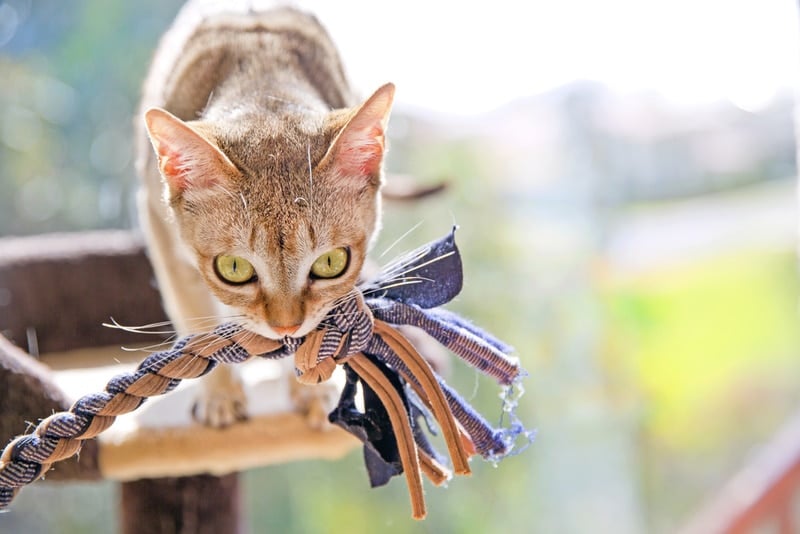
6. Consider Outdoor Time
Outdoor time is feasible for any cat, no matter where you live. Rather than sitting in a window chattering over the birds at the feeder, they can accompany you and explore the outdoors. Here are a few fun ideas to enhance your cat’s outdoor experience.
Catios
Catios might be expensive and hard to install, but they benefit cats. They can feel the breeze and hear all the sounds in nature without being in danger.
Walking on a Leash
Your cat can walk on a leash just like a dog. It might take time, the correct walking gear, and training, but they can learn to walk with a leash and harness.
Screened-In Porches
If you have a screened-in porch, you can allow your cat to come out and enjoy the breeze without scampering off to the woods or the road.
Playpens/Kennels
You can take your cat into the yard for playtime if they are monitored. You can install a playpen or kennel where they can feel the grass on their paws and get some sunshine.
7. Spay or Neuter
Once your cat starts nearing sexual maturity, you might notice an increase in energy. It would help if you got your cat spayed or neutered around 5 or 6 months of age.
You can consult your veterinarian about the best time to perform the surgery. Getting your cat spayed or neutered before the hormones officially take over can eliminate many annoying behaviors in males and females.
Both sexes have the capability of spraying to attract a mate and mark their territory. They can also get vocal, and males might get a little aggressive. Once your cat is spayed or neutered, you might notice that it takes a few months, but eventually, they calm down quite a bit.
Active cats might maintain a pretty peppy lifestyle, but there should be a noticeable decrease at least.
8. Check for Health Issues
Being hyper isn’t a cause for concern, but if you’ve noticed the increase in energy to be sudden, it could signal that something isn’t right with your cat.
An influx of energy could be triggered by an underlying health condition, such as hyperthyroidism. It is an overactive thyroid gland that causes an increase in restlessness, vocalization, erratic behavior, and other health problems.
If you suspect your cat’s hyperactivity is abnormal, make an appointment with your veterinarian right away.
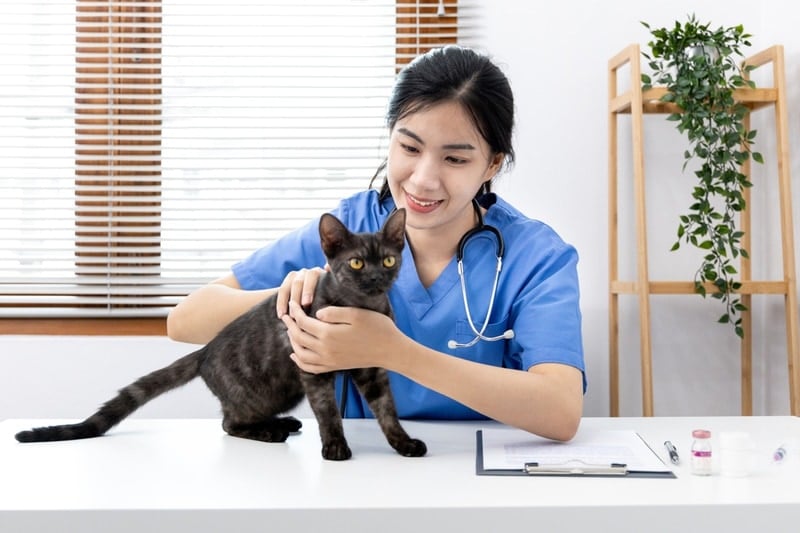
9. Try Supplements
If your cat doesn’t calm down, no matter what you do, you can always try supplements. Your vet can assess your cat’s behavior and recommend the right supplement.
Most of the time, supplements are available over-the-counter and contain harmless ingredients that relax your feline. You can also try aromatherapy and other relaxation methods to help your cat calm down, but remember that essential oils must be avoided.
Never give your cat any substance without checking with your veterinarian first to ensure it is completely safe. Even though some supplements on the market are geared toward cats, that doesn’t mean they are vet-approved or suitable for your feline.

Conclusion
Having a hyper cat isn’t necessarily a bad thing, but it can be tiring sometimes, mainly if it results in troublesome behaviors. You can try a few tips on our list to calm your kitty down.
However, if you think there is an underlying health issue or a behavioral problem, you should always take them to your vet just to be safe. Even if there is nothing physically wrong, your vet might have recommendations on additional ways to get a handle on excess energy.
See Also:
- Will Certain Scents Calm Cats? Everything You Need to Know!
- Reasons Cats Bite and How to Stop It (Our Vet Answers)
Featured Image Credit By: Nils Jacobi, Shutterstock

